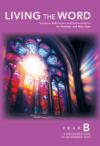Scripture Study for
Second Sunday of Easter
Acts 5:12–16 / Psalm 118:1 / Revelation 1: 9–11a, 12–13, 17–19 / John 20:19–31
<< Back to LECTIONARY RESOURCES
Understanding the Word
By Dianne Bergant, C.S.A.
“Signs and wonders” refers to the miracles that the apostles were able to accomplish through the divine power bestowed on them by Jesus. This passage is probably a collection of motifs rather than a coherent summary. It states that some people were afraid to join the community of believers; it then contradicts itself by claiming that great numbers were added to their ranks. Actually, both were probably true. The great accomplishments of the early Christians certainly struck fear in the hearts of some, while at the same time they attracted others. Fear and admiration can and do exist side by side, especially when the power of God is evident.
John is caught up by the Spirit and is commissioned by God as were the prophets of old. The function of his vision is twofold: it clarifies the nature of his task, and it confers divine authority on it. John is gripped with fear, literally frightened to death. The figure in the vision responds with the standard declaration of reassurance: Fear not! Do not be afraid! The figure then identifies himself with the classic divine self-revelation: I am! (égó eími). The figure in the vision clearly takes to himself divine characteristics. This vision is not merely for John; it is clearly meant for the churches as well.
It is on the evening of the Resurrection day itself that the Holy Spirit is bestowed on the disciples, who are then commissioned to go forth and declare salvation and judgment. The absent Thomas represents the second generation of Christians, those called to believe through the testimony of others. The faith required of him is, in a way, more demanding than that required of those who actually encountered the risen Lord. Viewed in this way, his doubt might be more understandable. According to Jesus, as profound as was Thomas’ ultimate faith, it does not compare with the faith of those who do not enjoy the kind of experience of the Lord described here.
